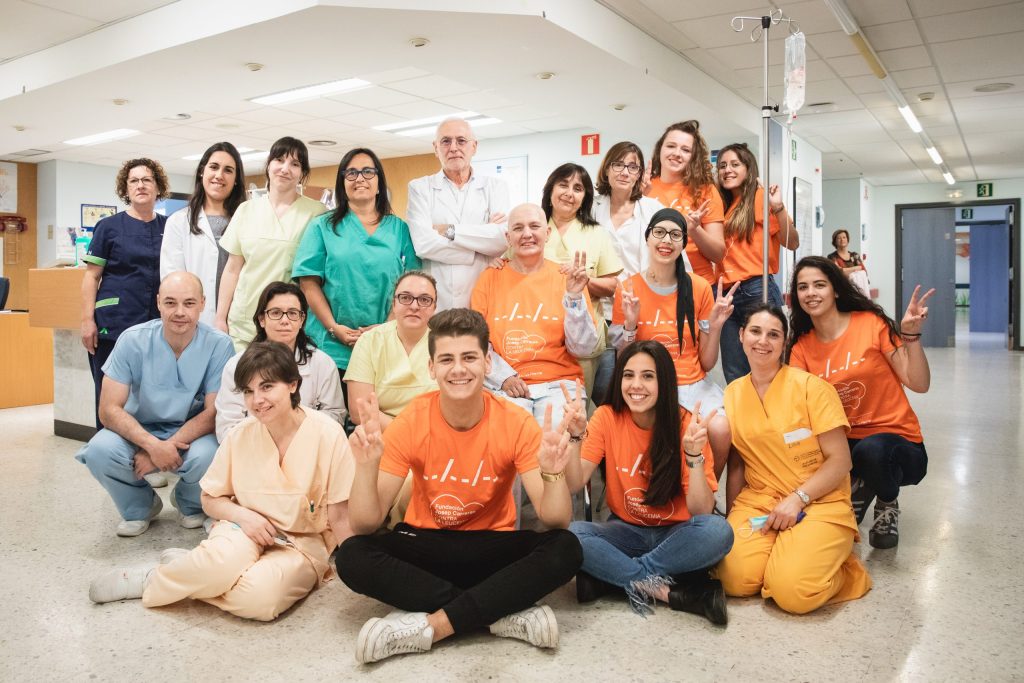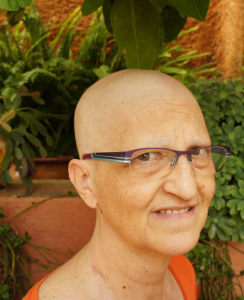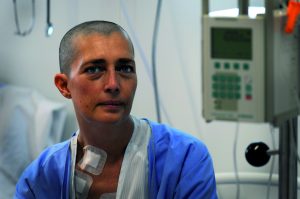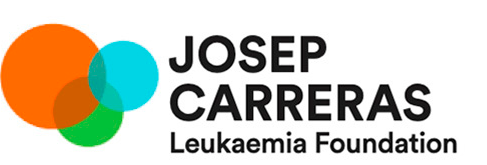MALT type extranodal B-cell lymphoma
The information provided on www.fcarreras.org is intended to support, not replace, the relationship that exists between patients/visitors to this website and their physician.

Information reviewed by Dr. Rocío Parody Porras, Doctor specialising in Haematology. Member of the Management of REDMO (Bone Marrow Donor Registry) and of the Foundation’s medical team. Barcelona Medical Association (Co. 35205)
What is MALT type extranodal B-cell lymphoma?
 MALT-type extranodal non-Hodgkin’s lymphomas are a rare form of indolent (slowly progressive) B-type lymphomas, accounting for about 7-10% of B-type non-Hodgkin’s lymphomas and up to 50% of lymphomas primarily affecting the stomach. ‘Extranodal’ refers to the primary site of presentation of the lymphoma being outside the lymph nodes. MALT is a mucosa-associated lymphoid tissue and is localised in specific areas: mucosa of the eyes, intestine, etc. For example, in Peyer’s patches, regions in the form of clusters of lymphoid tissue that line the inside walls of the small intestine. These are areas of the immune system where there are large numbers of immune cells, especially lymphocytes and dendritic cells. The term “MALT” is an acronym for “mucosa-associated lymphoid tissue”. Most cases occur in adults with an average age of 60 years, with a slight female predominance.
MALT-type extranodal non-Hodgkin’s lymphomas are a rare form of indolent (slowly progressive) B-type lymphomas, accounting for about 7-10% of B-type non-Hodgkin’s lymphomas and up to 50% of lymphomas primarily affecting the stomach. ‘Extranodal’ refers to the primary site of presentation of the lymphoma being outside the lymph nodes. MALT is a mucosa-associated lymphoid tissue and is localised in specific areas: mucosa of the eyes, intestine, etc. For example, in Peyer’s patches, regions in the form of clusters of lymphoid tissue that line the inside walls of the small intestine. These are areas of the immune system where there are large numbers of immune cells, especially lymphocytes and dendritic cells. The term “MALT” is an acronym for “mucosa-associated lymphoid tissue”. Most cases occur in adults with an average age of 60 years, with a slight female predominance.
Regarding the causes of MALT lymphoma, its development is usually preceded by a chronic inflammatory process which results in the recruitment of lymphocytes to the site of inflammation forming lymphoid tissue similar to Peyer’s patches. Infection by a bacterium that infects the human gastric epithelium, usually Helicobacter pylori (in 90% of cases), causes MALT tissue to appear in the form of follicular gastritis and, from this, molecular changes may occur that could lead to MALT lymphoma.
Other forms of MALT lymphomas have been linked to other infections such as:
- Cutaneous MALT lymphomas and Borrelia burgdorferi
- Ocular lymphomas and Chlamydia psitacci
- Intestinal lymphoma and Campylobacter jejuni
Other autoimmune conditions such as Sjögren’s syndrome or Hashimoto’s thyroiditis also present a higher risk of developing MALT lymphomas than in people free of autoimmune pathologies.
Regarding the particular clinical features of MALT lymphoma, patients usually visit a doctor with gastric symptoms: heartburn, haemorrhage, epigastric or abdominal pain. This type of lymphoma usually remains localised, but may eventually spread to other areas such as the lungs, intestines or bone marrow. In 10% of patients with MALT lymphoma, the disease develops into an aggressive lymphoma with a poor prognosis.
As for diagnosis, in addition to the tests common to other non-Hodgkin’s lymphomas (NHL), gastric MALT lymphomas should also be diagnosed by fibrogastroscopy with multiple biopsies from the different gastric regions. It is also important to perform an endoscopic ultrasound study to assess the depth of infiltration by the lymphoma; as this has been directly related to the response to treatment. The search for Helicobacter pylori is mandatory in gastric MALT lymphoma.
In addition to the usual morphological and immunophenotypic study, a cytogenetic analysis is recommended to detect the most important cytogenetic alterations:
t(11;18), t(14;18), t(1;14) and t(3;14).
What is the treatment for MALT type extranodal B-cell lymphoma?
 In cases of localised gastric MALT lymphoma, eradication of the bacterium Helicobacter pylori (present in the vast majority of cases) by means of antibiotics leads to disappearance of the lymphoma at microscopic level in most cases, although responses may be slow. Most gastric MALT lymphomas are in the localised stage at the time. The commonly accepted initial therapeutic strategy is antibiotic treatment combined with proton pump inhibitors. The most commonly used treatment regimen is clarithromycin, amoxicillin and omeprazole. There are other rescue regimens for cases in which the germ is resistant to first-line treatment.
In cases of localised gastric MALT lymphoma, eradication of the bacterium Helicobacter pylori (present in the vast majority of cases) by means of antibiotics leads to disappearance of the lymphoma at microscopic level in most cases, although responses may be slow. Most gastric MALT lymphomas are in the localised stage at the time. The commonly accepted initial therapeutic strategy is antibiotic treatment combined with proton pump inhibitors. The most commonly used treatment regimen is clarithromycin, amoxicillin and omeprazole. There are other rescue regimens for cases in which the germ is resistant to first-line treatment.
If the disease does not resolve or is not limited to the stomach, immunochemotherapy will be necessary, usually based on agents such as chlorambucil, fludarabine, bendamustine or CHOP-type combinations, associated with Rituximab (a monoclonal antibody against the CD20 receptor specifically presented by neoplastic lymphoid cells). Once achieved, remission is stable in 90% of cases. Radiotherapy has also been shown to be effective in this type of lymphoma and can be applied locally to the area affected by the lymphoma.
What are the chances of patients with MALT type extranodal B-cell lymphoma being cured?
Most MALT-type lymphomas have an indolent course and respond to local targeted therapies, such as eradication of Helicobacter pylori, surgery or radiotherapy, with a 5-year survival of 90%.
Links of interest concerning medical issues relating to MALT type extranodal B-cell lymphoma
MALT lymphoma (gastric and non-gastric). Lymphoma Action
MALT lymphoma. Macmillan Cancer Support
MALT Lymphoma. Cleveland Clinic
Links of interest on other topics related to non-Hodgkin’s lymphoma:
TESTIMONIAL MATERIALS
You can order the booklets in paper format for free delivery in Spain by e-mail: imparables@fcarreras.es
BONE MARROW TRANSPLANT
- Bone Marrow Transplant Guide. Josep Carreras Foundation (content in Spanish)
- What is HLA and how does it work? Josep Carreras Foundation (content in Spanish)
- Graft-versus-Host Disease. Josep Carreras Foundation (content in Spanish)
- History of Bone Marrow Transplantation. Josep Carreras Foundation (content in Spanish)
- How is the search for an anonymous donor conducted? Josep Carreras Foundation (content in Spanish)
FOOD
- How to maintain a healthy diet during treatment? Josep Carreras Foundation (content in Spanish)
- Nutrition guide. Leukemia & Lymphoma Society
OTHER
- Ideas on what to take with me to the isolation chamber. Josep Carreras Leukaemia Foundation (content in Spanish)
- Travel tips for people with cancer. Josep Carreras Leukaemia Foundation (content in Spanish)
- Physiotherapy manual for haematological and transplant patients. Josep Carreras Leukaemia Foundation (content in Spanish)
- Prevention and treatment of oral mucositis. Josep Carreras Leukaemia Foundation (content in Spanish)
- Oral hygiene in oncohaematological patients. Josep Carreras Leukaemia Foundation (content in Spanish)
- Fertility manual: Suffering from blood cancer and becoming a parent. Josep Carreras Leukaemia Foundation (content in Spanish)
- Skin care in the oncohaematological patient. Josep Carreras Leukaemia Foundation (content in Spanish)
- Aesthetic Oncology Manual. Josep Carreras Leukaemia Foundation (content in Spanish)
- Leukaemia and sexuality. Josep Carreras Leukaemia Foundation (content in Spanish)
- 7 ways to wear a scarf. Josep Carreras Leukaemia Foundation (content in Spanish)
Links of interest: local/provincial or state entities that can provide you with resources and services specialised in leukaemia, lymphoma or cancer patients:
In Spain there is a large network of associations for haematological cancer patients which, in many cases, can provide information, advice and even carry out certain procedures. These are the contacts of some of them by Autonomous Community:
All these organisations are external to the Josep Carreras Foundation.
STATE
- AMILO (Asociación Española de Amiloidosis)
- ACLIF (Asociación para la cura del linfoma folicular)
- AEAL (ASOCIACIÓN ESPAÑOLA DE AFECTADOS POR LINFOMA, MIELOMA y LEUCEMIA)
- AECC (ASOCIACIÓN ESPAÑOLA CONTRA EL CÁNCER). Present in the different provinces and in many municipalities. Contact the nearest branch or call 900 100 036 (24h).
- AELCLES (Agrupación Española contra la Leucemia y Enfermedades de la Sangre)
- CEMMP (Comunidad Española de Pacientes de Mieloma Múltiple)
- JOSEP CARRERAS LEUKAEMIA FOUNDATION
- FUNDACIÓN SANDRA IBARRA
- GEPAC (GRUPO ESPAÑOL DE PACIENTES CON CÁNCER)
- MPN España (Asociación de Afectados Por Neoplasias Mieloproliferativas Crónicas)
ANDALUCÍA
- AECC (ASOCIACIÓN ESPAÑOLA CONTRA EL CÁNCER). Present in the different provinces and in many municipalities. Contact the nearest branch.
- ALUSVI (ASOCIACIÓN LUCHA Y SONRÍE POR LA VIDA). Sevilla
- APOLEU (ASOCIACIÓN DE APOYO A PACIENTES Y FAMILIARES DE LEUCEMIA). Cádiz
ARAGÓN
- AECC (ASOCIACIÓN ESPAÑOLA CONTRA EL CÁNCER). Present in the different provinces and in many municipalities. Contact the nearest branch.
- ASPHER (ASOCIACIÓN DE PACIENTES DE ENFERMEDADES HEMATOLÓGICAS RARAS DE ARAGÓN)
- DONA MÉDULA ARAGÓN
ASTURIAS
- AECC (ASOCIACIÓN ESPAÑOLA CONTRA EL CÁNCER). Present in the different provinces and in many municipalities. Contact the nearest branch.
- ASTHEHA (ASOCIACIÓN DE TRASPLANTADOS HEMATOPOYÉTICOS Y ENFERMOS HEMATOLÓGICOS DE ASTURIAS)
CANTABRIA
- AECC (ASOCIACIÓN ESPAÑOLA CONTRA EL CÁNCER). Present in the different provinces and in many municipalities. Contact the nearest branch.
CASTILLA LA MANCHA
- AECC (ASOCIACIÓN ESPAÑOLA CONTRA EL CÁNCER). Present in the different provinces and in many municipalities. Contact the nearest branch.
CASTILLA LEÓN
- ABACES (ASOCIACIÓN BERCIANA DE AYUDA CONTRA LAS ENFERMEDADES DE LA SANGRE)
- AECC (ASOCIACIÓN ESPAÑOLA CONTRA EL CÁNCER). Present in the different provinces and in many municipalities. Contact the nearest branch.
- ALCLES (ASOCIACIÓN LEONESA CON LAS ENFERMEDADES DE LA SANGRE). León.
- ASCOL (ASOCIACIÓN CONTRA LA LEUCEMIA Y ENFERMEDADES DE LA SANGRE). Salamanca.
CATALUÑA
- ASSOCIACIÓ FÈNIX. Solsona
- FECEC (FEDERACIÓ CATALANA D’ENTITATS CONTRA EL CÁNCER
- FUNDACIÓ KÁLIDA. Barcelona
- FUNDACIÓ ROSES CONTRA EL CÀNCER. Roses
- LLIGA CONTRA EL CÀNCER COMARQUES DE TARRAGONA I TERRES DE L’EBRE. Tarragona
- MielomaCAT
- ONCOLLIGA BARCELONA. Barcelona
- ONCOLLIGA GIRONA. Girona
- ONCOLLIGA COMARQUES DE LLEIDA. Lleida
- ONCOVALLÈS. Vallès Oriental
- OSONA CONTRA EL CÀNCER. Osona
- SUPORT I COMPANYIA. Barcelona
- VILASSAR DE DALT CONTRA EL CÀNCER. Vilassar de Dalt
VALENCIAN COMMUNITY
- AECC (ASOCIACIÓN ESPAÑOLA CONTRA EL CÁNCER). Present in the different provinces and in many municipalities. Contact the nearest branch.
- ASLEUVAL (ASOCIACIÓN DE PACIENTES DE LEUCEMIA, LINFOMA, MIELOMA Y OTRAS ENFERMEDADES DE LA SANGRE DE VALENCIA)
EXTREMADURA
- AECC (ASOCIACIÓN ESPAÑOLA CONTRA EL CÁNCER). Present in the different provinces and in many municipalities. Contact the nearest branch.
- AFAL (AYUDA A FAMILIAS AFECTADAS DE LEUCEMIAS, LINFOMAS; MIELOMAS Y APLASIAS)
- AOEX (ASOCIACIÓN ONCOLÓGICA EXTREMEÑA)
GALICIA
- AECC (ASOCIACIÓN ESPAÑOLA CONTRA EL CÁNCER). Present in the different provinces and in many municipalities. Contact the nearest branch.
- ASOTRAME (ASOCIACIÓN GALLEGA DE AFECTADOS POR TRASPLANTES MEDULARES)
BALEARIC ISLANDS
- ADAA (ASSOCIACIÓ D’AJUDA A L’ACOMPANYAMENT DEL MALALT DE LES ILLES BALEARS)
- AECC (ASOCIACIÓN ESPAÑOLA CONTRA EL CÁNCER). Present in the different provinces and in many municipalities. Contact the nearest branch.
CANARY ISLANDS
- AECC (ASOCIACIÓN ESPAÑOLA CONTRA EL CÁNCER). Present in the different provinces and in many municipalities. Contact the nearest branch.
- AFOL (ASOCIACIÓN DE FAMILIAS ONCOHEMATOLÓGICAS DE LANZAROTE)
- FUNDACIÓN ALEJANDRO DA SILVA
LA RIOJA
- AECC (ASOCIACIÓN ESPAÑOLA CONTRA EL CÁNCER). Present in the different provinces and in many municipalities. Contact the nearest branch.
MADRID
- AECC (ASOCIACIÓN ESPAÑOLA CONTRA EL CÁNCER). Present in the different provinces and in many municipalities. Contact the nearest branch.
- AEAL (ASOCIACIÓN ESPAÑOLA DE LEUCEMIA Y LINFOMA)
- CRIS CONTRA EL CÁNCER
- FUNDACIÓN LEUCEMIA Y LINFOMA
MURCIA
- AECC (ASOCIACIÓN ESPAÑOLA CONTRA EL CÁNCER). Present in the different provinces and in many municipalities. Contact the nearest branch.
NAVARRA
- AECC (ASOCIACIÓN ESPAÑOLA CONTRA EL CÁNCER). Present in the different provinces and in many municipalities. Contact the nearest branch.
BASQUE COUNTRY
- AECC (ASOCIACIÓN ESPAÑOLA CONTRA EL CÁNCER). Present in the different provinces and in many municipalities. Contact the nearest branch.
- PAUSOZ-PAUSO. Bilbao
AUTONOMOUS CITIES OF CEUTA AND MELILLA
- AECC CEUTA (ASOCIACIÓN ESPAÑOLA CONTRA EL CÁNCER)
- AECC MELILLA (ASOCIACIÓN ESPAÑOLA CONTRA EL CÁNCER)
Support and assistance
We also invite you to follow us through our main social media (Facebook, Twitter and Instagram) where we often share testimonies of overcoming this disease.
If you live in Spain, you can also contact us by sending an e-mail to imparables@fcarreras.es so that we can help you get in touch with other people who have overcome this disease.
* In accordance with Law 34/2002 on Information Society Services and Electronic Commerce (LSSICE), the Josep Carreras Leukemia Foundation informs that all medical information available on www.fcarreras.org has been reviewed and accredited by Dr. Enric Carreras Pons, Member No. 9438, Barcelona, Doctor in Medicine and Surgery, Specialist in Internal Medicine, Specialist in Hematology and Hemotherapy and Senior Consultant of the Foundation; and by Dr. Rocío Parody Porras, Member No. 35205, Barcelona, Doctor in Medicine and Surgery, Specialist in Hematology and Hemotherapy and attached to the Medical Directorate of the Registry of Bone Marrow Donors (REDMO) of the Foundation).
Become a member of the cure for leukaemia!


